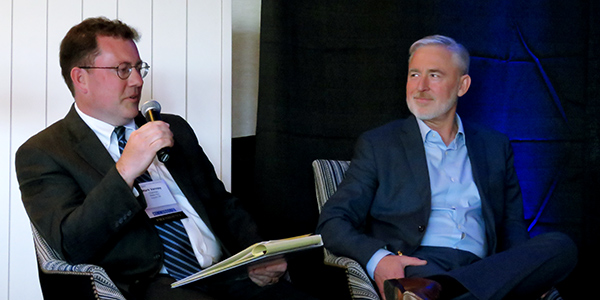ISO-NE’s Board of Directors deals with turnover every year, but two board members will retire in both 2021 and 2022. According to materials presented to the NEPOOL Participants Committee last week, these departures will create expertise and leadership gaps on the RTO’s board.
Board Chair Kathleen Abernathy gave a presentation — originally delivered to the Joint Nominating Committee (JNC) in December — on ISO-NE’s “roadmap” for future director appointments.
Abernathy (2021) is one of the four retiring directors in the next two years, along with Philip Shapiro (2021), Barney Rush (2022) and Vickie VanZandt (2022). Rush is chair of the board’s Markets Committee and an electricity markets expert, which makes it critical to replace with him, according to Abernathy’s presentation, as New England’s future grid priorities rely on “innovative, reliable, well functioning markets.” The region also depends on having a robust transmission network, and VanZandt is a national transmission expert who has planned, built and operated bulk power transmission systems.
The retirements of Abernathy and VanZandt additionally result in the board’s loss of two of its three female directors. “Board diversity has been a core tenet of ISO New England and has been present since its inception,” Abernathy said. “We are focused on ensuring we have the necessary range of technical and life skills to provide proper oversight as we address the issues of reliability and the clean-energy transition.”
Improving Nomination Transparency
ISO-NE General Counsel Maria Gulluni and NEPOOL Secretary David Doot followed Abernathy with a general overview of the JNC’s process for selecting candidates, as well as options to improve its transparency.
The JNC comprises seven board members, NEPOOL’s six sector leaders and a representative of the New England Conference of Public Utilities Commissioners (NECPUC). With input from the board, state representatives and market participants, the committee identifies the types of expertise that ensure ISO-NE has “sufficient knowledge and expertise to act as the RTO for New England,” according to the Participants Agreement (PA) between ISO-NE and NEPOOL.
JNC members sign a nondisclosure agreement that prohibits sharing nonpublic information. The NDA is primarily intended to protect the identity of unsuccessful candidates, but it does not include, for example, role descriptions and search criteria.
Transparency of the search process became an issue in September, when former Maine Public Utilities Commission Chair Mark Vannoy was elected to the board on a slate with incumbent Directors Brook Colangelo and Roberto Denis. The slate was approved by the RTO’s board and endorsed by the PC.
Although the JNC approved the slate unanimously, stakeholders at the time told RTO Insider the leaders of NEPOOL’s End User and Alternative Resources sectors attempted to withdraw their support for Vannoy after hearing negative feedback from their sector members. The sector leaders were not permitted to identify Vannoy until after the JNC voted under RTO rules. (See Consumer Advocates Upset with Pick for ISO-NE Board.)
Gulluni and Doot said that the JGC could improve transparency through more “robust reporting” of, for example, what happened at its meetings. But other changes may require amendments to the PA and need both ISO-NE and NEPOOL approval. NEPOOL needs a 70% vote for endorsement, and FERC must additionally review and approve any changes. Any renegotiation of the PA may also open it to unrelated issues raised by participants, states or the RTO, they said.
Energy Market Value Rises
ISO-NE COO Vamsi Chadalavada reported the energy market value for December was $426 million (through Dec. 29), up $181 million from November and down $42 million from the same month last year.
Natural gas prices were 120% higher than November average values, which pushed the average real-time hub LMPs to $42.04/MWh, up 71% from the prior month. Average natural gas prices and real-time hub LMPs were down 7.5% and 1.7%, respectively, from the same period last year.
Average day-ahead cleared physical energy during the peak hours as a percentage of the forecasted load was 98.5% during December, down from 99.6% during November, with the minimum value for the month of 93.5% posted Dec. 5.
Daily uplift, or net commitment period compensation (NCPC) payments, in December totaled $3.4 million over the period, up $1.4 million from November and down $1.3 million from December 2019. NCPC payments were 0.8% of the energy market value.




